Known for the dramatic tale of Joseph, Dothan's biblical significance unfolds mysteries and ancient stories waiting to be discovered.
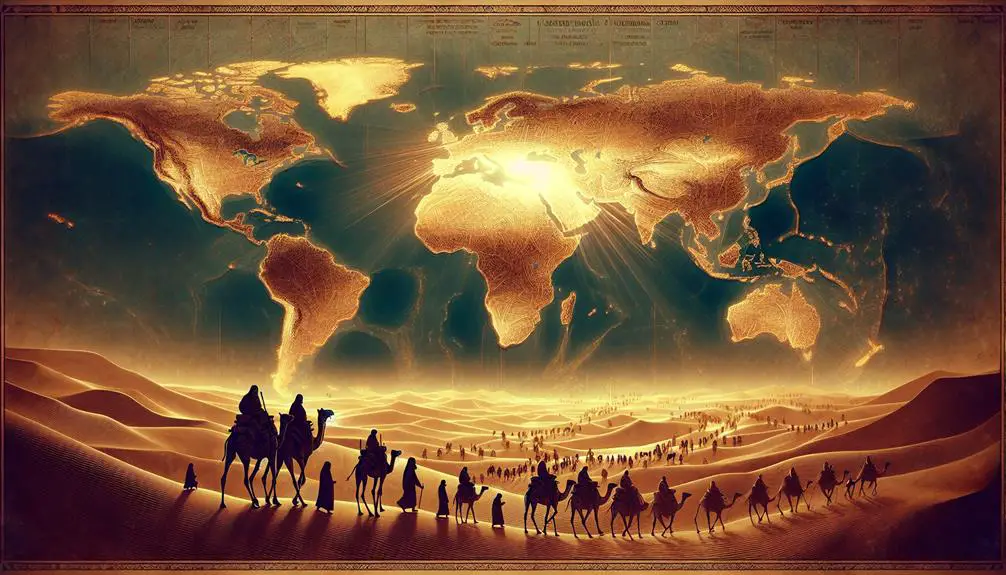
Where Is Dothan in the Bible
Like a scene straight out of a drama, the tale of Joseph being sold into slavery by his brothers unfolds in Dothan. You might recall this pivotal event, but have you ever wondered about the backdrop of this story?
Situated in a narrative rich with betrayal and destiny, Dothan's geographical and historical significance in the Bible extends beyond Joseph's saga. Its mention in other contexts provides a fascinating glimpse into ancient life and spiritual lessons.
As we explore its biblical roots, you'll find there's more to uncover about Dothan's role and why it remains a point of intrigue in both historical and religious studies.
Key Takeaways
- Dothan is the setting for Joseph's betrayal by his brothers, leading to his slavery in Egypt.
- It is also where the prophet Elisha experienced divine protection against an enemy army.
- Positioned in northern Samaria, Dothan was a crucial crossroads for ancient trade routes.
- Archaeological discoveries in Dothan provide insights into its biblical significance and daily life in ancient times.
The Geographical Location of Dothan
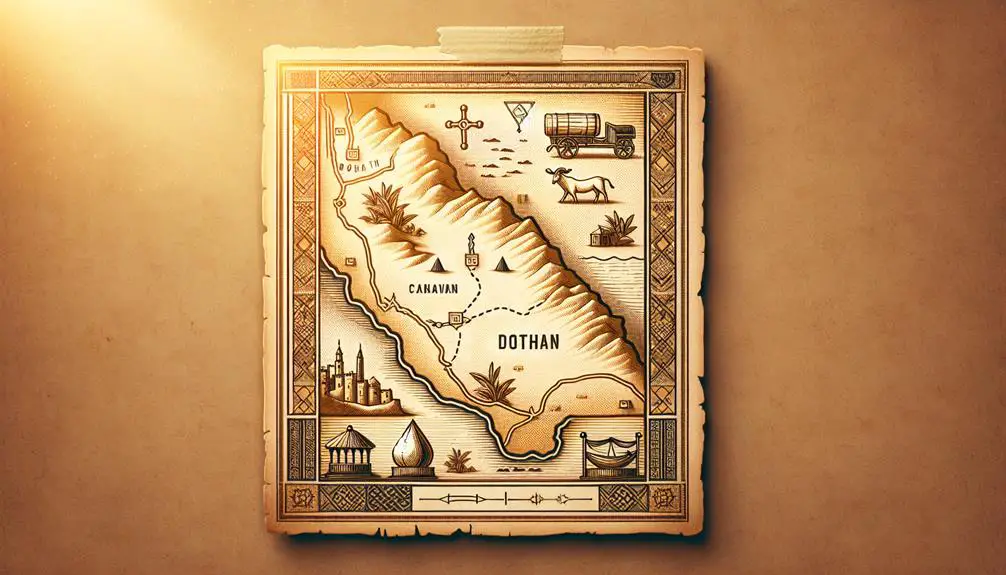
Dothan is strategically located in the fertile plains of northern Samaria, often serving as a crucial crossroads in ancient times. Its positioning not only facilitated trade routes between Egypt and Assyria but also impacted its socio-economic development significantly. You're delving into a region that's rich in history, yet its geographical specifics offer even more to understand.
Analyzing Dothan's climate, you're looking at a typical Mediterranean environment, characterized by mild, wet winters and hot, dry summers. This climate played a pivotal role in the agricultural prosperity of the area, allowing for the cultivation of various crops. It's this abundance that likely contributed to Dothan's significance as a gathering and trading hub in antiquity.
When considering nearby cities, it's essential to understand Dothan's relative isolation yet its strategic importance. To the south, you'd find Samaria, the ancient capital of the Northern Kingdom of Israel, which provided political and religious influence over the region. To the north, the city of Megiddo, another significant biblical site, known for its strategic location controlling a vital pass through the Carmel Ridge. These cities, along with Dothan, formed a triangle of historical and geographical significance, influencing trade routes, military campaigns, and cultural exchanges.
This analysis reveals not just the physical location of Dothan but its broader context within ancient Near Eastern geopolitics. Understanding Dothan's climate and its relation to nearby cities offers a glimpse into the daily life and economic conditions of its inhabitants, highlighting the interplay between geography and history in shaping human civilization.
Dothan in Joseph's Story
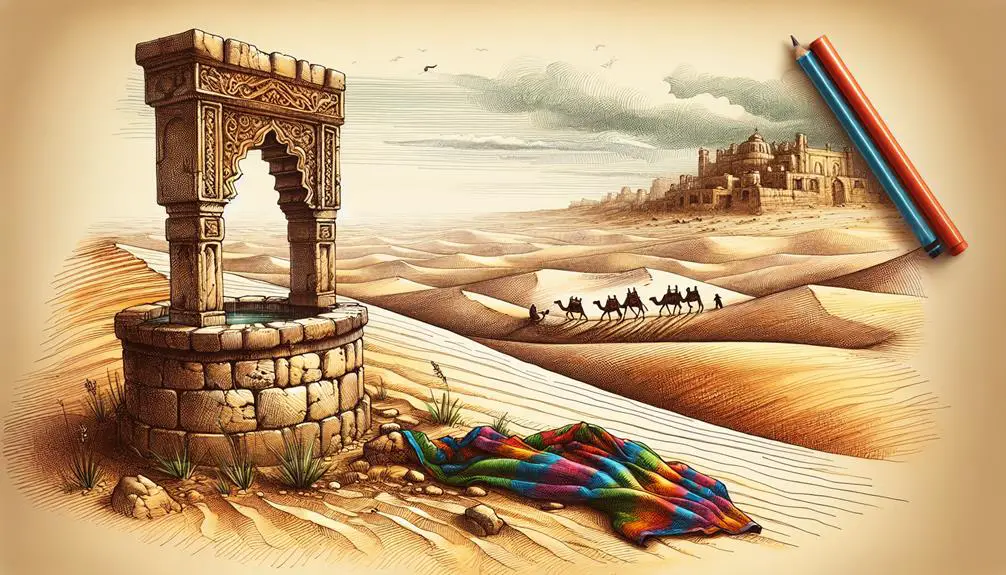
Shifting focus to a notable biblical narrative, you'll find that Joseph's story intricately weaves through the historical and geographical tapestry of Dothan. This location is pivotal, not merely as a backdrop, but as a catalyst in the unfolding drama fueled by familial discord and prophetic dreams. Joseph, the favored son of Jacob, is dispatched to Dothan by his father to check on his brothers and the welfare of their flocks. It's here, amidst the rolling hills and pastoral landscapes of Dothan, that the simmering tensions borne out of Joseph's dreams and his brothers' jealousy reach a boiling point.
Joseph's dreams, vivid and prophetic, foretell a future where he'd rise to a position of power and authority, with his family bowing down to him. These dreams, shared with naivety but received with malice, sow seeds of discord among his brothers. Their jealousy, already kindled by their father's overt favoritism towards Joseph, finds a fertile ground in Dothan, setting the stage for a pivotal turn in Joseph's life. The brothers' initial plot to kill Joseph, later downgraded to selling him into slavery, marks a critical juncture in the biblical narrative. Dothan thus becomes the setting where Joseph's dreams inadvertently propel him towards his destiny, albeit through the harsh avenues of betrayal and separation from his family.
In analyzing Joseph's story within the context of Dothan, one can't overlook the intricate interplay of dreams, jealousy, and divine providence. This narrative segment, deeply embedded in the fabric of Dothan's biblical significance, highlights the complexity of human emotions and the unpredictable path of destiny.
Other Biblical References to Dothan
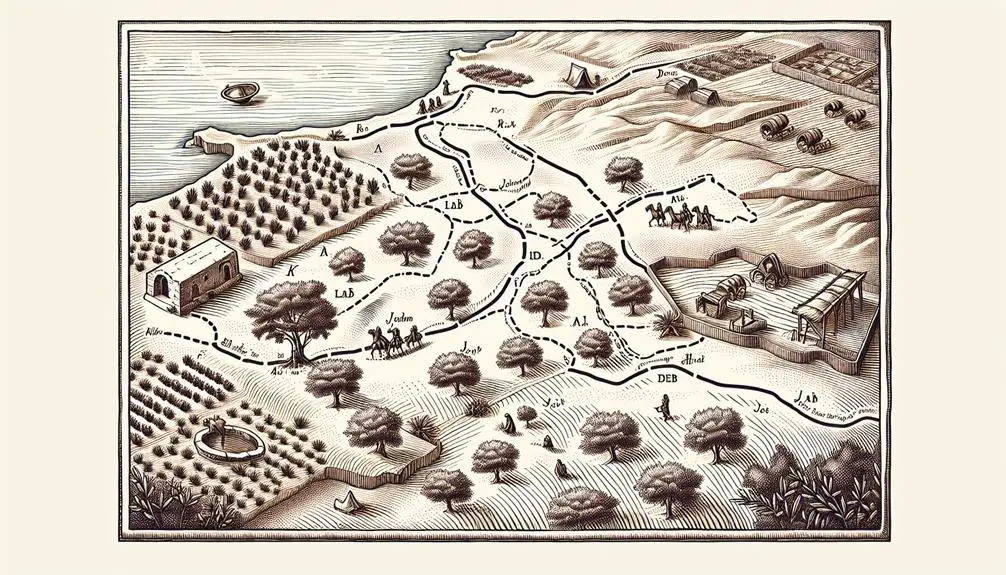
Beyond Joseph's narrative, Dothan holds further biblical relevance, notably in the account of Elisha's divine encounter. This location not only underscores pivotal moments in biblical narratives but also highlights its historical and spiritual significance within the ancient landscape.
Analyzing these instances, you'll uncover layers of Dothan's role in shaping theological discourse and historical understanding.
Joseph's Journey to Dothan
Joseph's journey to Dothan, as recounted in the biblical narrative, marks a pivotal moment in the broader story of his life and the intricate dynamics of his family relationships. This event isn't merely a geographical movement but a significant plot twist that highlights the complex interplay of dream interpretations and brother dynamics.
As you dive into the text, you'll notice how Joseph's ability to interpret dreams, coupled with his favored status, exacerbates tensions among the brothers. Dothan becomes the backdrop for a dramatic unfolding of envy and deceit, serving as a crucible in which Joseph's character and destiny are forged.
Analyzing this passage, it's clear that the journey to Dothan is a linchpin, setting in motion the events leading to Joseph's eventual rise in Egypt.
Elisha's Encounter at Dothan
Another pivotal moment in biblical narrative, involving Dothan, unfolds with the prophet Elisha, showcasing a remarkable demonstration of divine protection amidst geopolitical intrigue. This story, rich in Elisha's miracles, illustrates the prophet's protection in a moment of crisis. When enemies surrounded Dothan to capture him, Elisha prayed, leading to a miraculous blinding of the opposing forces.
Aspect |
Detail |
Significance |
|---|---|---|
Location |
Dothan |
Site of divine intervention |
Action |
Elisha's prayer |
Catalyst for a miracle |
Outcome |
Enemy forces blinded |
Illustration of Prophet's protection |
This episode underlines the power of faith and the protective hand of the divine, highlighting Elisha's role as a vehicle for God's miracles.
Dothan's Ancient Significance
While Elisha's miraculous encounter at Dothan underscores divine intervention, the city's biblical significance extends further through its historical and prophetic contexts.
You'll find that Dothan serves as more than just a backdrop for divine narratives; it's a rich tapestry of cultural practices and religious significance woven into the fabric of biblical history.
This city, mentioned sparingly, holds a mirror to the evolving religious landscape, offering insights into the practices and beliefs of its time.
Its mention alongside significant biblical events and figures not only highlights its importance but also invites a deeper understanding of its role in shaping and reflecting the religious life of ancient communities.
Thus, Dothan stands as a testament to the intertwining of daily life and divine influence in biblical times.
Archaeological Excavations at Dothan

You'll find that the archaeological excavations at Dothan have significantly advanced our understanding of the site's historical context within the biblical narrative.
The discovery of ancient Dothan, alongside numerous artifacts unearthed, provides concrete evidence of the city's existence and its cultural and economic activities.
These findings have offered profound insights into the impact of this location on the broader historical and theological landscape.
Discovery of Ancient Dothan
Archaeological excavations at Dothan have unveiled a rich tapestry of history, shedding light on its biblical significance and the everyday lives of its ancient inhabitants. The city's strategic location, influenced by Dothan's climate and proximity to nearby cities, played a crucial role in its historical development. Here's what the discoveries tell us:
- Dothan's Geographic Advantage: Its moderate climate and fertile land supported diverse agricultural activities.
- Trade and Connectivity: Positioned near vital trade routes, it facilitated interactions with nearby cities, enhancing its economic and cultural exchanges.
- Urban Planning Insights: Excavations reveal sophisticated urban planning, indicative of a well-organized societal structure.
- Cultural Intersections: Findings suggest a melting pot of cultures, influenced by its geographic neighbors and transient populations.
These elements collectively paint a picture of Dothan as a vibrant, strategically located city with a rich historical tapestry.
Artifacts Unearthed
Building on the understanding of Dothan's historical significance, the artifacts unearthed during excavations offer concrete insights into the daily lives and cultural practices of its ancient inhabitants.
Preservation techniques play a crucial role in maintaining the integrity of these artifacts, ensuring they survive long after their discovery. This involves meticulous cleaning, stabilization, and sometimes, restoration efforts to bring these treasures back to a state where they can be studied and displayed.
Artifact authentication, a detailed and scholarly task, ensures the genuineness and accurate dating of these finds. Through rigorous scientific analysis, experts determine the origins, age, and usage of each item, piecing together a vivid picture of past societies.
These processes are instrumental in constructing a reliable narrative of human history at Dothan, bridging gaps between the past and the present.
Excavation Impact Insights
Several archaeological excavations at Dothan have significantly advanced our understanding of the ancient city's societal structure and economic practices. Through meticulous analysis, these digs have painted a detailed picture of life in Dothan, highlighting:
- The complexity of urban planning, revealing a sophisticated societal hierarchy.
- Evidence of trade networks, underscoring Dothan's economic significance in the region.
- The diversity of religious practices, reflecting a melting pot of cultural influences.
- Artifacts that denote technological advancements, showcasing innovation and adaptation.
Excavation challenges, such as environmental degradation and human activity, have necessitated robust preservation efforts. These endeavors are crucial for safeguarding Dothan's archaeological integrity, allowing scholars to continue unraveling the city's historical narratives and its pivotal role in ancient civilizations.
Dothan's Role in Ancient Trade
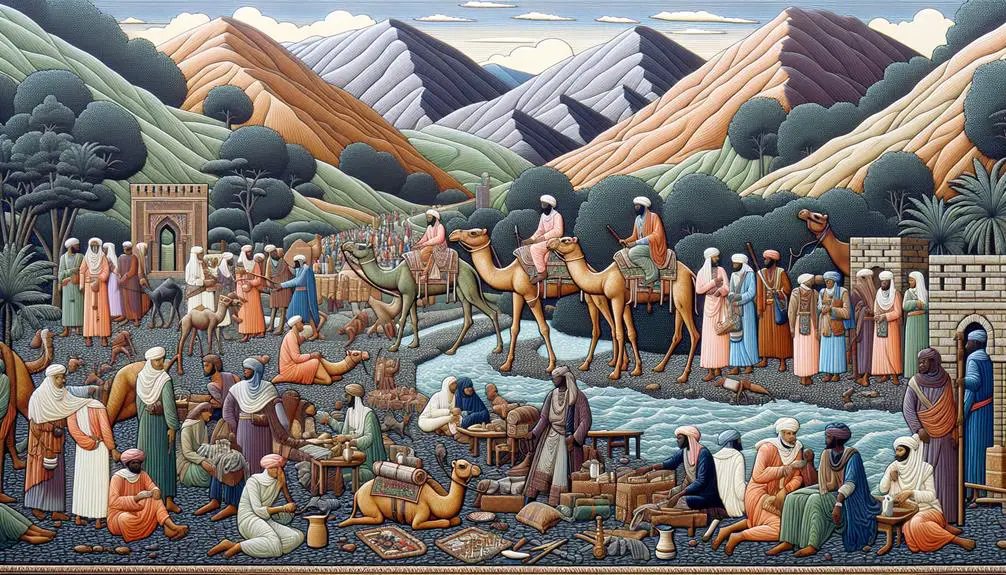
Dothan's strategic location positioned it as a vital hub in ancient trade networks, facilitating the movement of goods between Egypt and the Mesopotamian regions. Its significance in the realm of ancient commerce cannot be overstated, as it served not only as a crossroads for trade routes but also as one of the key caravan stops, offering respite for traders and their beasts of burden. The city's accessibility to various regions made it an indispensable node in the intricate web of trade that connected the ancient Near East.
Aspect |
Details |
|---|---|
Trade Routes |
Dothan sat at the crossroads of major trade routes, linking Egypt to Mesopotamia, thereby serving as a conduit for goods, cultures, and ideas. |
Caravan Stops |
As a caravan stop, it provided essential services for traders and travelers, such as water, food, and shelter, ensuring the sustainability of long-distance trade. |
Goods Traded |
The city saw a variety of goods pass through, including spices, textiles, precious metals, and ceramics, reflecting the diverse nature of ancient trade. |
Analyzing Dothan's role in ancient trade reveals its contribution to economic and cultural exchanges across civilizations. It was more than just a city; it was a linchpin in the economic and cultural fabric of the ancient Near East, fostering connections that transcended geographical boundaries. The archaeological evidence supports the view of Dothan as a bustling trade center, with finds indicating a rich tapestry of interactions facilitated by its strategic position. Through this lens, you gain a deeper understanding of Dothan's significance in the ancient world, underscoring its role as a crucial hub in the network of trade that shaped civilizations.
Modern Recognition of Biblical Dothan
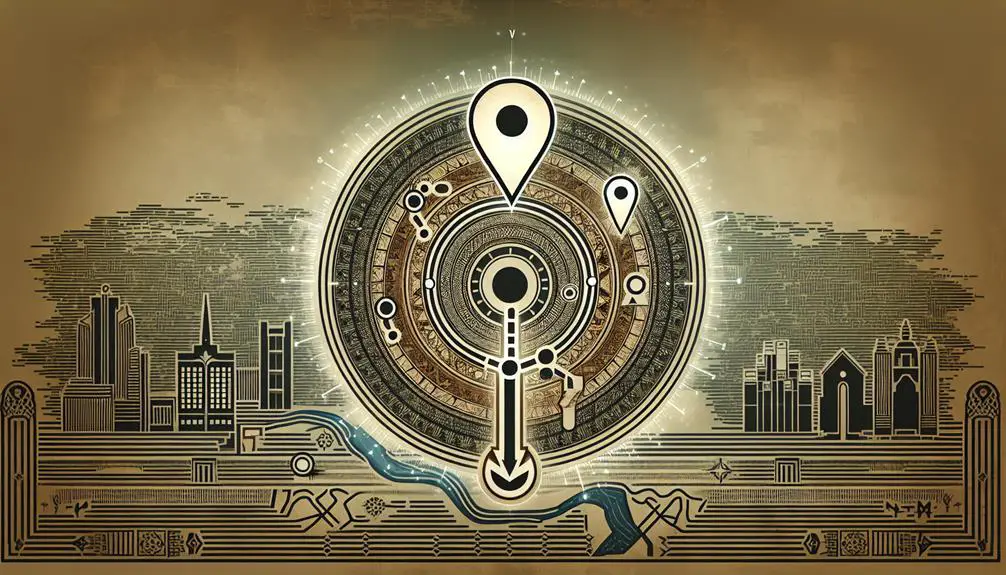
How does the modern world recognize and remember the biblical city of Dothan, a site of profound historical and religious significance?
Today, Dothan's legacy is preserved and celebrated through various means that highlight its biblical importance, fascinating history, and the unique Dothan climate that has shaped its landscape over millennia. To paint a clearer picture, consider the following aspects:
- Archaeological Discoveries: Excavations in the area have unearthed artifacts and structures dating back to the biblical era, providing tangible links to the past. These findings offer insights into the daily lives of the inhabitants and the city's role in ancient narratives, making Dothan a focal point for scholars and enthusiasts alike.
- Cultural Significance: Dothan's mention in the Bible as the backdrop for Joseph's betrayal by his brothers imbues the site with deep cultural and religious meaning. This story is commemorated by various religious communities, reinforcing Dothan's spiritual significance.
- Modern Tourism: The allure of walking in the footsteps of biblical figures draws visitors from around the globe. Modern tourism initiatives leverage Dothan's climate and historical appeal, offering guided tours and educational programs that delve into its biblical and historical context.
- Preservation Efforts: Recognizing the site's historical and religious importance, international and local entities have undertaken efforts to preserve Dothan's ruins. These endeavors ensure that the site remains accessible to future generations, eager to explore its rich past.
Frequently Asked Questions
How Has Dothan Influenced Modern Religious Practices and Beliefs?
Dothan's geography and its spiritual symbolism have subtly influenced modern religious practices and beliefs.
You'll find that its historical backdrop enriches contemporary understanding of faith, offering a tangible connection to biblical narratives.
This place's significance, woven into sermons and teachings, highlights the enduring impact of biblical locations on today's spirituality.
Are There Any Significant Festivals or Traditions That Originate From Biblical Events Associated With Dothan?
You're probably wondering if time-traveling back to Dothan would reveal any unique festivals or traditions.
Analyzing Dothan's geography and its link to Joseph's journey, it's clear that while specific festivals directly originating from these biblical events are scarce, the impact on cultural and religious practices is undeniable.
The narrative of Joseph, deeply woven into the fabric of various traditions, illustrates how ancient stories continue to shape modern observances, albeit more in spirit than in direct replication.
How Do Contemporary Scholars Reconcile Discrepancies Between Archaeological Findings and Biblical Narratives in Dothan?
Contemporary scholars use geophysical methods and textual criticism to bridge discrepancies between archaeological findings and biblical narratives.
You'll find they meticulously analyze soil samples, artifacts, and landscape changes to understand historical contexts.
Through textual criticism, they examine ancient manuscripts, comparing variations and contextualizing historical texts.
This approach allows them to piece together a more accurate historical picture, reconciling apparent inconsistencies and enriching our understanding of ancient narratives.
What Impact Did the Stories Associated With Dothan Have on the Development of Biblical Literature and Theological Thought?
Just like a tree's roots strengthen and spread through the soil, stories from Dothan have deeply influenced biblical literature and theological thought.
Specifically, Dothan's geography, intertwined with Joseph's resilience, serves as a powerful metaphor for overcoming adversity.
This narrative hasn't only enriched biblical texts but also stimulated profound theological discussions.
It's a testament to how geography and individual stories can profoundly shape religious narratives and beliefs.
How Has the Portrayal of Dothan in Various Media (Films, Books, Art) Evolved Over Time, and What Impact Does This Have on Public Perception of Its Biblical Significance?
You've noticed how Dothan's depiction in films, books, and art has changed over time, haven't you?
This evolution in Dothan's cinematography and artistic interpretations impacts how people perceive its importance. Initially, portrayals might've been straightforward, but today's renditions are more nuanced, blending historical accuracy with creative liberties.
This shift not only enriches the narrative but also influences public understanding, making its biblical significance more accessible and relatable to a broader audience.
Conclusion
Ironically, despite Dothan's seemingly modest role in the broader biblical narrative, it's where the complexity of ancient geopolitics and theology intertwine.
You've seen how Dothan is more than just a backdrop for Joseph's dramatic saga; it's a nexus of ancient trade, a subject of archaeological fascination, and a testament to the enduring legacy of biblical locations in modern memory.
So, while Dothan mightn't headline the biblical story, its layers of history and meaning prove that sometimes, it's the quiet places that hold the loudest echoes.

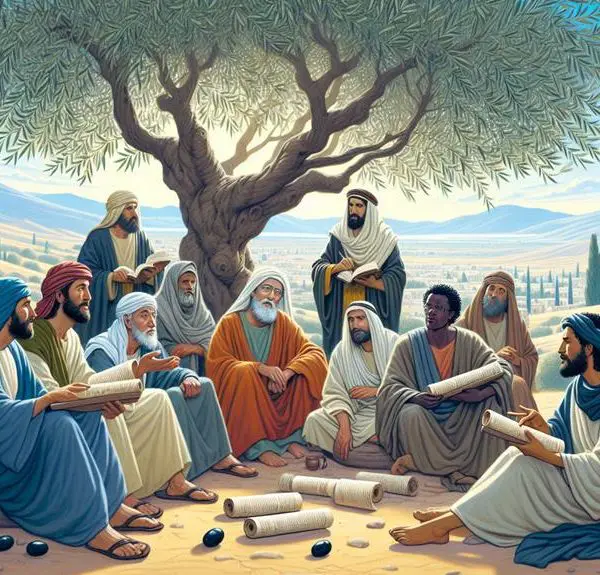

Sign up